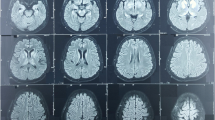Abstract.
We describe a 58-year-old patient with relapsing high-grade non-Hodgkin’s lymphoma who exhibited exacerbation of posthypoxic action myoclonus during high-dose intravenous trimethoprim-sulfamethoxazole (TMP-SMX) treatment for highly suspicious Pneumocystis jiroveci pneumonia (PCP). Three months previously the patient had experienced a hypoxic insult caused by respiratory arrest due to an anaphylactic reaction to antibiotic therapy. He had developed posthypoxic action myoclonus (Lance-Adams syndrome), which was well controlled by oral treatment with piracetam. However, after TMP-SMX therapy (115 mg/kg daily) was started for suspicion of newly developed PCP, posthypoxic action myoclonus worsened dramatically resulting in complete disability. Anti-myoclonic therapy with increased doses of piracetam and valproic acid did not significantly improve his clinical condition. Only when TMPSMX doses were reduced (38 mg/kg daily) on day 12 did action myoclonus cease within 2 to 3 days. We suggest that TMP-SMX can exacerbate posthypoxic action myoclonus.
Similar content being viewed by others
Author information
Authors and Affiliations
Corresponding author
Rights and permissions
About this article
Cite this article
Jundt, F., Lempert, T., Dörken, B. et al. Trimethoprim-Sulfamethoxazole Exacerbates Posthypoxic Action Myoclonus in a Patient with Suspicion of Pneumocystis jiroveci Infection. Infection 32, 176–178 (2004). https://doi.org/10.1007/s15010-004-3011-6
Received:
Accepted:
Issue Date:
DOI: https://doi.org/10.1007/s15010-004-3011-6




